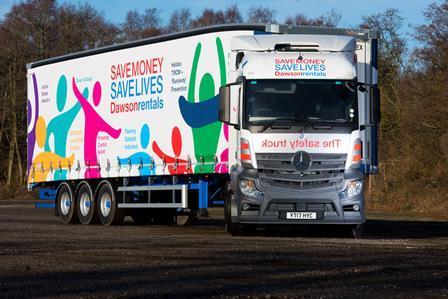
Dawsonrentals Truck & Trailer MD John Fletcher talks bubbles, Brexit, RVs, Chinese trucks and skills shortages with Andy Salter.
John Fletcher is easy to interview: offer the odd question or comment to keep the conversation bubbling along, but otherwise sit back and fill your notebook. What’s more it’s sensible stuff because, along with many senior colleagues in the company, Fletcher has a wealth of experience in the commercial vehicle sector. He worked at both TLS and TIP before joining Dawsonrentals 17 years ago and since 2011 has been MD of the Truck & Trailer business.
As is customary on such occasions, we open with a “how’s business?” ice breaker and Fletcher is away. “We have our strongest forward order book for long-term rental for a long time, the short-term rental sector, however, is a chaotic market,” he explains.
“All the pricing is mixed up, we’ve got wholesale rates being made available to the retail market. There’s a lot of talk about a PCP [personal contract purchase] bubble in the car market and I think the same is emerging in the commercial vehicle sector.
“There are strategies being put in place today by some players in the market for, potentially, short-term gain, which will have a huge impact on the market for the next 10 years. This is distorting the market.”
The Dawsons business model is based around three key ingredients, says Fletcher. “We have to buy the asset for the right price; operate the asset at a fair price for the end user and sell the asset at the right price at the end of contract. All three of those items have to come together in some sort of equilibrium for us to be able to satisfy our customers and, ultimately, our shareholders. We’re concerned this bubble is distorting the market.
“We will only buy vehicles we believe we can sell, so it’s essential we buy the right products at the right prices,” he continues. “Like everyone we’ve made mistakes in the past, but we now have very clear thinking about the vehicles we acquire. We’ve shifted our buying profile, we’re less singular in the make and type of vehicles we buy. We’re now tending to go for higher horsepower vehicles, it makes them easier to sell in the second hand market.
“We have to focus on the back-end market for the vehicles at the front end of the buying cycle.”
Market analysis
It’s clear Fletcher and the team at Milton Keynes spend a lot of time analysing the used truck market and he has a number of interesting observations.
“Euro-6, for example, has no export market, not yet, so those products aren’t going on a boat any time soon,” he says. “That will change as the export markets catch up with the tighter emissions legislation of Europe, but currently we have to find a domestic market for those vehicles.
“Legislation, such as the ULEZ [Ultra Low Emissions Zone] in London and the clean air zones elsewhere will drive the market in that direction, so second-hand demand will emerge. But as a result, non-Euro-6 product in the domestic market will become increasingly challenged.
“If we look at the African market there are some very interesting economic developments at play. East Africa for example (Kenya, Uganda etc) have become very difficult markets for Europeans to operate in.
Over the past five to 10 years, the Chinese have invested heavily in those economies and are benefiting from duty concessions on their products. We’ve seen a continuing hike on import duty for European importers in a lot of those countries.

Chinese competition
“We now have a situation where an operator can get a new Chinese 6x2 tractor unit for $32,000 (£23,200), which is roughly what we’ll be looking for on a five-year-old Mercedes Actros. If the man can get new Chinese trucks for the same price as second-hand European ones, why wouldn’t he?
“If we look a bit closer to home the Eastern Europe used market still offers an outlet,” continues Fletcher, “but this has been affected by a number of market changes: the Mercedes Axor was a good product for those countries as we were able to convert to left-hand drive relatively easily, though they have now stopped making it, which has closed that option off.
“On the other hand, the value of sterling has given us some advantage in the European export markets.”
Moving on from the market analysis, Fletcher turns his attention to the business offering. While there are some simple business rules at the core of the Dawsons offer, as Fletcher explains, the company continues to evolve its offering to the road freight transport sector.
“We’re not just rental,” he says. “We have an approach which takes in contract hire, leasing, traditional finance and fleet management. We’re everything to do with the ownership and operational model. Our model is based on usage. You tell us what you need and we’ll find good answers.
“For us the operation of the vehicle is all-important. We are genuinely concerned about mis-operation as we want to protect customers and other road users as well as our assets. We’re spending a lot on active and passive safety features on our vehicles, for example, and for those users who want greater assurance, we have developed a safety pack for our vehicles. For an extra £2,500 we can enable features such as autonomous braking, air bag and close proximity sensors. We are looking to improve the safety of our assets and give our users peace of mind.”
Vehicle safety has become a key priority for the company, and Fletcher confirms that the choice of manufacturer is increasingly being driven by the availability of safety features. (See our special safety supplement in MT 5 March for more details).
“We had been very weighted towards Mercedes in our vehicle selection,” he says. “They have invested heavily in safety features and have a good reputation in the used market. The vehicles are well liked by the market. On total cost of ownership they score very highly and, obviously, this is a very important calculation for us. However, we also have good relationships with manufacturers like MAN, Scania, Iveco and DAF and look forward to future safety enhancements from them.”
The Brexit question
We can’t let an interview pass by these days without some recourse to Brexit and, as you’d expect, Fletcher has some thoughts to share. “It’s hard not to see that there are clouds on the horizon as we go through the process,” he says. “The default position across the industry has always been ‘if in doubt, do nowt’ and I think that’s what worries us all, in business, most.
“It’s very easy to create a case for not making any investments and adopt a wait-and-see approach. That said, the UK economy is still strong and as a nation we still have a lot of credibility in the world.
“Furthermore, you can’t deliver goods without vehicles, so no matter where we are as an economy we are going to need to move things around and that will require trucks and trailers.
“Opportunities will emerge providing you stay close to your customers and we are continuing to invest in new product. We have an order for 400 rigid vehicles to be delivered in the spring, a mixture of Scania, MAN, Mercedes and Volvo equipped with bodywork from a mixture of Lawrence David, Solomon, Paneltex and PPS. This remains a strong market for us – value driven, building vehicles for our customers. We had 1,000 new vehicles in 2017 and I am already expecting to acquire approximately 600 vehicles overall in 2018.”
New talent
Like many in the transport and logistics sector Dawsons has its radar up on talent acquisition, ensuring the business is developing the right staff and skills for the future. Fletcher takes us through some of the thinking.
“This is a business critical area for us,” he says. “We must find ways to attract the right calibre of people to lead the business in the future.
“We attended a careers fair in Milton Keynes and got really good engagement, with over 200 leads from people wanting to come and work for with us. They probably hadn’t even heard of Dawsons before that event. The people who want to work for us don’t know it yet.
“We have to show the right people we want them to join us. New graduates want and expect a career, they want to be developed and we have to ensure we match their expectations.
“We want them to join our industry. This sector is genuinely addictive, once you’re on it you can’t get off. We already have some real high flyers emerging, who will ensure this business is in good shape for the future.”













